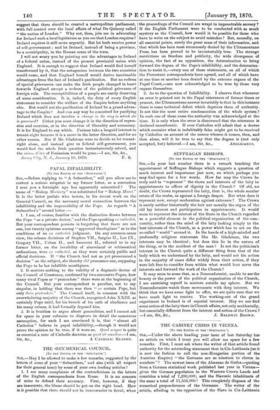SUFFRAGAN BISHOPS.
[TO THE EDITOR OF THE "SPECTATOR..,] SIR,—In your last number there is a remark touching the appointment of Suffragan Bishops which suggests a question of much interest and importance just now, on which perhaps you may find space for a few words. How far may the Crown be truly said to " represent " the views and interests of the laity in appointments to offices of dignity in the Church ? Of old, no doubt, the Crown represented the laity, that is, the whole secular estate of the realm, as against a foreign despot. But what does it represent now, except moderation against extremes ? The Crown is surely neither historically the heir nor morally the organ of the old lay interest and participation in appointments. It would seem to represent the interest of the State in the Church regarded as a powerful element in the political organization of the com- munity, rather than the mind of the laity looking simply to the best interests of the Church, as a power which has to act on the so-called "world" around it. In the hands of a high-minded and profoundly religious statesman like Mr. Gladstone, the two interests may be identical ; but does this lie in the nature of the thing, or in the accident of the man ? Is not the politician's interest in the Church quite a different thing from that of the body which we understand by the laity, and would not his action in the majority of cases differ widely from their action, if they were left free to consider from within what would best serve the interests and forward the work of the Church ?
It may seem to some that, as a Nonconformist, unable to see the beauty or the power of the political organization of the Church, I am exercising myself in matters outside my sphere. But we Nonconformists watch these movements with deep interest. We think that we have some light to offer, we are quite sure that we have much light to receive. The working-out of the grand experiment in Ireland is of especial interest. May we not find some action of the laity there in Church affairs, not only accidentally, but essentially different from the interest and action of the Crown ?


































 Previous page
Previous page